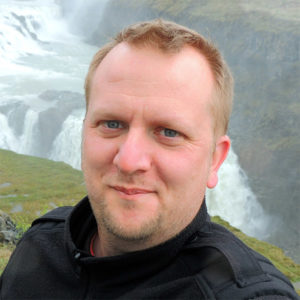Are you inspired by day-to-day interactions with people and the outside world? Are you struggling to find the motivation to create whilst living in lockdown? Edward Parnell – a writer, tutor and arts festival director – shares how you can find inspiration in limited landscapes and connect with writers across the world by joining an online course.
As someone who has been writing full-time for a few years, in some ways (at least on the face of things) the Coronavirus lockdown hasn’t seemed that different to me. I’m used to being housebound most days, staring at my computer screen hoping that words will soon come (they might, if I actually started typing and stopped browsing the web), socially distancing from everyone except my cat. But this isn’t the same. For one thing my partner is now in the house all day, working from home, so the usual silence is filled with the sound of video meetings and conference calls; it’s amazing how interesting the minutiae of another’s work becomes when you’re trying to avoid doing your own.
But, too, there’s an undoubted strain that hangs in the ether like virally tinged air droplets: the uncertainty and worry of what will happen next, to where all this will lead. And, on a personal level, it’s difficult to motivate myself to get on with putting together the proposal for the narrative non-fiction project I’m meant to be working on – a book that’s supposed to involve lots of travel. What’s the point in rushing, I think. Why not wait until the time comes when I’m more certain I’ll be able to travel once more. Instead, I harbour hopes of beginning a new novel, six years after my first, The Listeners, came out. With fiction there’s less need for me to physically visit locations, I tell myself. Though still, place means a lot in my books and I love to walk the fields and streets I’m writing about; at least, I always have before.
‘these strange days are all experience, and ultimately will find their way into so much of the writing and art we produce’
So, like so many others, my grandiose plans for a spurt of heightened productivity – including, away from work and writing, the numerous garden and DIY tasks I finally feel I should bodge my way towards tackling – seem not to be quite progressing as planned. Instead, I’ve felt increasingly grateful to have been teaching an online course for the National Centre for Writing: Start Writing Creative Non-fiction. Reading the excellent and varied work from my students, who hail from across the globe, has been a godsend. The course started back in February, though even then we had participants in East Asia who were at an advanced and different point in the lockdown cycle. Accordingly, I altered some of the content to accommodate the new social restrictions – a number of the exercises and assignments were concerned with observing people and places, activities that overnight became more challenging.
Yet, for most of the students, some form of daily walk is still an option, and this is something I also have taken solace in. On my allotted stroll I’ve found myself on a track just a mile away from my house where small groups of Roe Deer have gathered in the dusk along this forgotten stretch of sedge-strewn river valley; in all my years of living in such close proximity I’d never observed these animals here before, usually passing over the chance to explore locally in favour of drives to more-distant birdwatching hotspots. There’s a mindfulness in the constraints imposed upon my wanderings: suddenly, the glimpse of a common bird species such as a Coot on a previously unknown decoy pond, takes on a huge significance as it finds its way onto my list of lockdown fauna; seen anywhere else on a lake or nature reserve I would have barely given this solitary black waterbird more than a glance.
On a longer walk I revisit a route I had last undertaken a couple of years before, when researching my latest book Ghostland. In a belt of woodland along the edge of the grounds of a grand hall designed by Capability Brown I had previously written:
‘Once into the estate I walked alongside a bare-leafed wood into which mysterious deep, brick-lined pits were dug, perhaps, I wondered, part of an old drainage system. (Though, briefly, I also questioned if there was a more outlandish or darker purpose to which they had ever been put.) A rusting iron ladder was angled into the dark sludge at the bottom of one of them, begging the thought as to why anyone would want to climb down: presumably it was there more as a means of escape? In any case, I did not investigate.’

Image: Ed Parnell
That winter’s afternoon was very different to this latest visit. Then, the light was fading, the understorey a carpet of dead beige leaves; today, the same strangely cloudless sky that has persisted for the past week or more lends the place a less sinister aspect. The ladder has gone, too. And the undergrowth is more verdant – though soon it will grow denser and greener still. But it feels good to have returned to this spot that so struck me first time around. Even if, in the sunlight, the mystery seems diminished. It puts me back in that moment when I was writing Ghostland, makes me yearn to get on with writing something new.

Image: Ed Parnell
These walks – and the interaction with the National Centre for Writing students – have been a real help with thinking about my own work and creative processes; hopefully, the experience has been productive for them too. I’m so glad I’m scheduled to be teaching the course again, starting in early May.
And although I dare to dream that in the not-too-distant future I might just start to make progress with my non-fiction proposal, or tentatively begin a new novel, I know it’s fine if I don’t. Because these strange days are all experience, and ultimately will find their way into so much of the writing and art we produce. In the meantime, I look forward to reading other people’s assignments, and trying to impart something of what little wisdom I’ve previously gained from The Listeners and Ghostland.
Time, for now, seems changed. Other things can come to fruition when they will.
About Ed
 Edward Parnell lives in Norfolk and has an MA in Creative Writing from the University of East Anglia. He has been the recipient of an Escalator Award from the National Centre for Writing, and in 2009 received a Winston Churchill Travelling Fellowship to fund a seven-week book research expedition to the Australian Outback. The Listeners, Ed’s first novel (and first book) won the 2014 Rethink New Novels Prize. His second book, Ghostland, a work of narrative non-fiction was published in October 2019 by William Collins. He is the Director of the Wymondham Words literature festival. Website
Edward Parnell lives in Norfolk and has an MA in Creative Writing from the University of East Anglia. He has been the recipient of an Escalator Award from the National Centre for Writing, and in 2009 received a Winston Churchill Travelling Fellowship to fund a seven-week book research expedition to the Australian Outback. The Listeners, Ed’s first novel (and first book) won the 2014 Rethink New Novels Prize. His second book, Ghostland, a work of narrative non-fiction was published in October 2019 by William Collins. He is the Director of the Wymondham Words literature festival. Website
Start Writing Creative Non-Fiction (begins May 2020)

Discover the core techniques for writing a non-fiction book, be it a biography, a memoir, reportage or another of the many flourishing forms within this exciting field of writing. Over 12 weeks of structure teaching, group discussion and personal feedback, this course will give you the essential tools you need to progress. Book now
